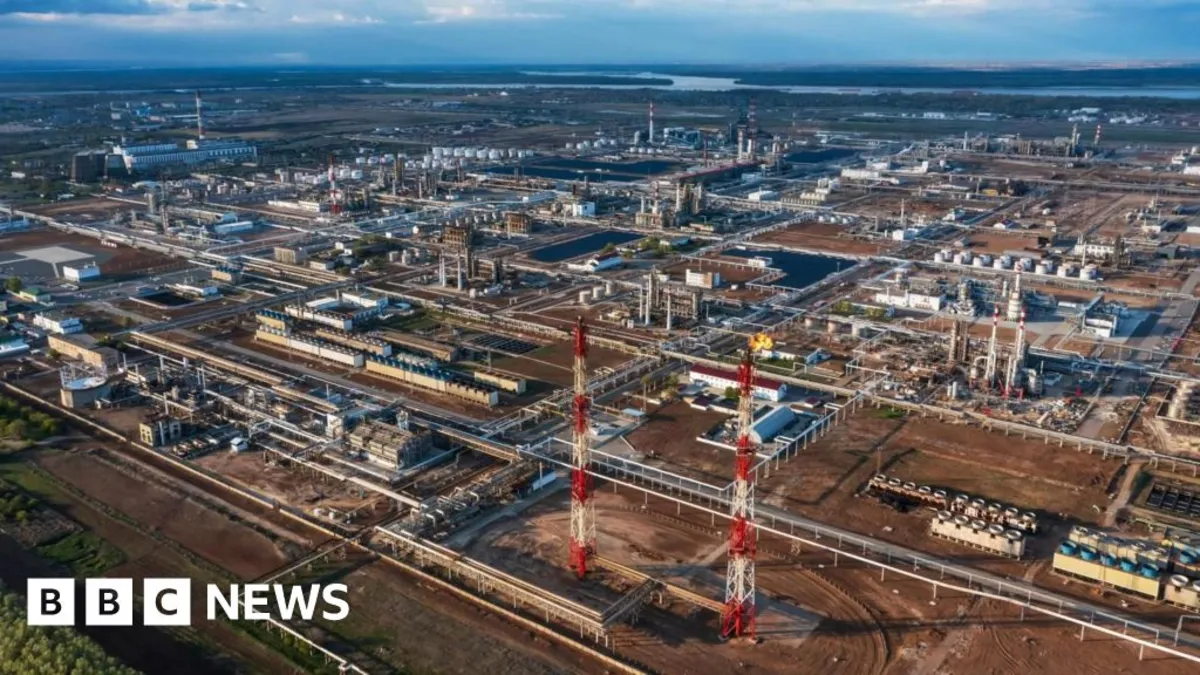
In a bold move, US President Donald Trump has announced significant new sanctions targeting two of Russia's largest oil companies, aiming to pressure Moscow into halting its ongoing war on Ukraine. The sanctions focus on Rosneft and Lukoil, two major players in the Russian oil industry, which are believed to be instrumental in funding the Kremlin's military efforts, as explained by US Treasury Secretary Scott Bessent. This marks the first direct sanctions imposed by the Trump administration in response to Russia's invasion of Ukraine, highlighting a pivotal moment in global geopolitics.
The sanctions, enacted by the US Department of the Treasury's Office of Foreign Assets Control (OFAC), effectively blacklist Russia's two largest oil producers. Rosneft, a state-controlled entity led by Igor Sechin, a close ally of Russian President Vladimir Putin, and Lukoil, a privately owned corporation, together account for nearly 50% of Russia's crude oil exports, according to estimates from Bloomberg. Collectively, these companies are responsible for exporting approximately 3.1 million barrels of oil per day, with Rosneft contributing to nearly half of Russia’s oil production, which constitutes about 6% of the global output as per the UK government’s estimates.
In recent months, ending the Russia-Ukraine war has emerged as a key priority for Trump, especially following his role in brokering a ceasefire in Gaza. However, a similar resolution in Ukraine has remained elusive despite his campaign promises. A summit with Putin in August did not produce substantive outcomes, leading to increasing frustration from the US administration. While the US and its allies have been cautious about restricting the Russian energy sector due to potential repercussions on the global economy, Trump has intensified pressure on US allies to reduce their reliance on Russian oil.
The refusal of Putin to cease hostilities was ultimately a catalyst for these sanctions, as highlighted by Bessent. The announcement of these sanctions comes just a week after the UK took similar action against Rosneft and Lukoil, and merely a day after the White House postponed a planned follow-up meeting with Putin in Budapest. During his remarks, Trump expressed dissatisfaction with the lack of progress after conversations with the Russian leader, stating, "I just felt it was time. We waited a long time."
The implications of these sanctions are viewed as both symbolic and economic. While Trump has largely focused on negotiating a peace deal, two former US ambassadors to Ukraine noted that the long-term significance of these sanctions remains uncertain. Ambassador John Herbst commented, "The sanctions will certainly hurt the Russian economy, which is already stumbling," but cautioned against expecting immediate results in terms of peace negotiations. Bill Taylor, another former ambassador, indicated that these sanctions signal to President Putin that he must engage in discussions.
Trump has proposed freezing hostilities along current frontlines, suggesting a division of territory, a notion that Russia has resisted. The new sanctions, targeting a critical sector of the Russian economy, may compel Moscow to reconsider its stance, although analysts expect limited immediate changes on the battlefield. According to Dr. Stuart Rollo from the University of Sydney's Centre for International Security Studies, these sanctions aim to both weaken Russia's capacity to continue the war and incentivize Moscow to negotiate peace out of fear of economic repercussions. He noted, however, that while the sanctions may pressure Russia politically, they might not significantly hinder its military operations.
The sanctions are poised to inflict substantial damage on Russia's economy, with the oil and gas sectors contributing roughly 25% of the national budget. The repercussions may extend beyond Russia, affecting its primary clients, including China and India, the world's two most populous nations. These countries together account for a significant portion of Russia's energy exports, with China importing over 100 million tonnes of Russian crude oil last year, amounting to nearly 20% of its total energy imports. Similarly, oil imports from Russia to India have surged to around $140 billion since 2022.
Trump has encouraged these nations to cease their purchases of Russian oil, which could force them to seek alternative suppliers, potentially at a higher cost. Failure to comply could lead to secondary sanctions from the US. As a result, Indian state refiners are reportedly reviewing their oil trade agreements with Russian companies to ensure compliance with the new sanctions.
Recent announcements of sanctions have already resulted in a spike in global oil prices, with Brent, a major international crude oil benchmark, experiencing a 5% increase. This rise is notable, especially when compared to the 1.6% uptick following the UK's sanctions on Rosneft and Lukoil. The Russian embassy in London had earlier warned that targeting major energy companies would disrupt global fuel supplies and increase costs worldwide, although those predictions have not manifested significantly.
Dr. Rollo cautioned that unless secondary sanctions related to shipping and finance are strictly enforced, the recent surge in oil prices may not be sustained in the long run. He suggested that the immediate effects on oil prices are unlikely to persist, and the global market could stabilize unless further actions are taken against Russian oil transactions.